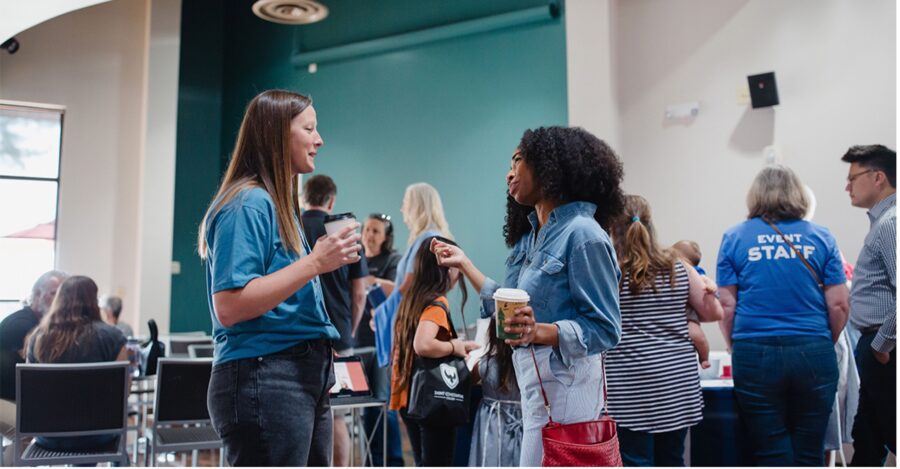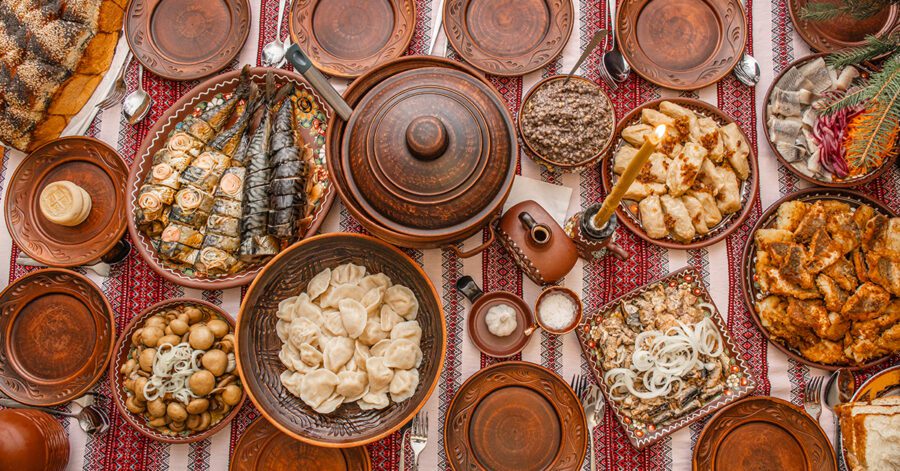In 2019, a small group of CC tutors and leaders gathered together to talk about mathematical dimensions. Leigh Bortins, Classical Conversations founder, and Dr. Kirsty Gilpin, lead mathematician, used materials from Classical Conversation’s math curriculum, The Math Map to guide the conversation and invite those present to participate in the math conversation of the ages. As they wrestled with the math concepts, fellowshipped through laughter and shared testimonies, and shared new insights, three truths became evident.
God Is the Center of Everything
Though those gathered shared the assumption that God is the center of everything, several attendees admitted that they were not in the habit of discovering God through math education in their homeschools. Though experienced in integrating other strands of the CC Challenge curriculum, math often felt isolated, with any integrations feeling manufactured rather than stemming naturally from students’ conversations.
During their time together, the group began to identify intersections of math with the other strands, and most importantly, with their faith. Using materials from The Math Map revealed that pursuing math understanding was essential to knowing God. Far from being mutually exclusive, faith and intellect work together to teach us more about Him.
Jill Philbrick summed this up when she said, “Joy is the best word to describe how I feel knowing that The Math Map will help me to teach math and guide my students toward Christ.”
Math Requires an Understanding of Its Grammar
CC parents know that before you understand any topic, you must first know the grammar. Take, for example, the following terms: obi and rei. Those sound like fantastic Star Wars® characters, don’t they? But a karate student will learn that an obi is a belt, and rei means “to bow.” Thus, beginning karate students spend as much time learning the grammar (or the language) of the art as they do learning how to tie their belts and bow to their classmates.
Similarly, math is communicated through a unique language, one that requires time and attention to learn.
An emphasis on learning the language of mathematics has long been ignored by conventional math education. Students are evaluated on their ability to calculate well and quickly. Thus, students often skip studying mathematical language in favor of completing calculations as quickly as they can. Many students who are successful calculators may not develop an underlying understanding of the related concepts and face roadblocks as problems and exercises grow in complexity and detail, and understanding the language becomes ever more critical.
After grammar, math requires fluency.
As students and their teachers encounter these more complex exercises, they diverge into two groups. Students and their teachers who are fluent in the language of math continue to delight and press on in studying mathematical concepts often thought of as advanced. By contrast, for students and teachers who did not establish a solid grammatical foundation, math becomes a struggle. Students who do not have a solid grasp of math grammar may, or who are not quick calculators, may believe that they are not “math people,” and they are excluded from the math conversation that requires more than calculation skills.
Redeeming Education and Math Fluency Are Positively Correlated
“I feel like I am just now being invited into a conversation from which I have before been excluded!” said Jennifer Riels, another tutor who took part in The Math Map gathering.
She had believed the messages from conventional math curricula and the teachers that use them that she was not a “math person” and that advanced ideas were beyond her comprehension. Her comment marks the moment she realized everyone can enjoy, understand, and converse about math.
The key to participation in the math conversation is speaking the language. As we redeem our own math educations, we must take time to learn the grammar of mathematics and become fluent in its unique notations and specific meanings. Teaching the language is always easier when we are fluent in it! The Math Map provides the tools to redeem your own education and to pass on a legacy of discovering God through math your students.
Leigh has long said that, “We’re all math people!” As CC’s founder, she affirms that CC exists to fulfill its mission by curating curriculum, providing services, and equipping parents to build flourishing homeschool communities. With the launch of The Math Map, this extends to equipping parents to learn the grammar of mathematics! Leigh knows that as parents develop math fluency, their confidence to lead their family in great math conversations will flourish.
Through language and problem-solving, parents’ math education will be redeemed!
Just like Leigh invited the tutors and leaders at that early gathering to participate in a common math conversation, she extends the invitation to all CC families to join the math conversation of the ages through The Math Map.
Read: “Why Math Is Important”
How to Get Started with The Math Map
The Math Map invites you to join a journey of mathematical discovery. Wherever you are on your math journey, The Math Map is ready to help you to navigate the world of mathematics with confidence. Discover the beauty and wonder of God’s creation through mathematics.
If you’re already a member of Classical Conversations, you can engage with The Math Map through TMM Companion in CC Connected right now. You can access digital preview versions of select levels, access an extensive glossary, and utilize a reference correlated to the printed booklets that includes solutions to problems, explanations of concepts on the weekly charts, questions to take the conversation deeper, and additional game instructions, with additional content being continually developed and added.
Years of pilot tutors and families agree that the best way for parents to begin reclaiming their own math education is to work through the Naturals level of the curriculum. As parents trace, draw, and copy, they are introduced to the layout of The Math Map and to the full scope of the mathematics language used throughout The Math Map. The Naturals level is also an ideal way to prepare students without previous The Math Map experience for The Math Map Complex.
The Math Map Complex printed curriculum is available for purchase in the bookstore. This is the resource used in the Challenge A community.
Classical Conversations and The Math Map are excited to support parents as they reclaim their own math education and lead their families and communities in joining the math conversation. Specialized curriculum assistants moderate discussion forums in CC Connected. A weekly book club, hosted by curriculum authors Leigh Bortins and Kirsty Gilpin, invites attendees to discover God through math and explores how using the classical skills of learning make The Math Map a truly classical math curriculum.
Join The Math Map Book Club
All are welcome to join The Math Map book club live to participate in the conversation and ask their questions about the math topics and the curriculum. The discussions each week offer deep insights into the curriculum and its application.
Key Details
- Held every Wednesday at 1 PM ET
- Follows the same outline used in the CC Challenge Community
- Explores every topic in The Math Map
- Accessible to parents using any level of The Math Map.
Join with other parents to be encouraged and equipped in your math teaching journey. Get expert guidance, practical tips, and deeper insight into the math concepts being discussed.
Visit Leigh Bortins’ website for the complete book club schedule and additional information.
Want to get a taste of what the book club offers? Watch the first episode now!
Join Leigh and Kirsty as they guide you through The Math Map, helping you and your children discover the beauty and logic of mathematics from a classical, Christian perspective.




